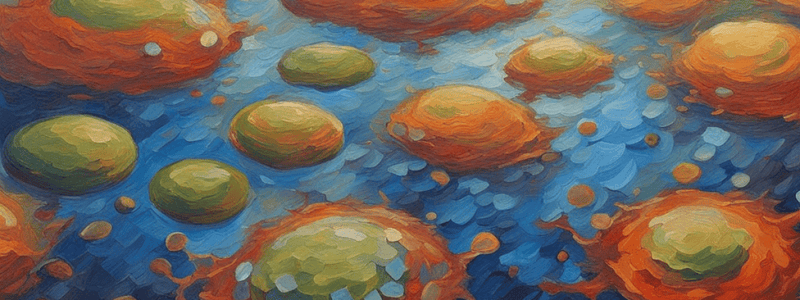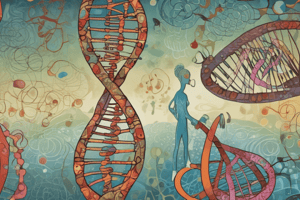Podcast
Questions and Answers
Match the following with their respective descriptions:
Match the following with their respective descriptions:
Somatic cells = Cells that make your organs and tissues Germ Cells = The ONLY cells that are not somatic – sperm and egg (Gametes) Meiosis = Includes two nuclear divisions Mitosis = Preceded by one round of DNA replication
Match the following with their respective characteristics:
Match the following with their respective characteristics:
Human Microbiome = Cells within and on us that are not actually of us, constitute the human microbiome 2n Cells = Division preceded by one round of DNA replication mtDNA = Genetic material present in a Human cell nDNA = Arranged on multiple chromosomes; twenty three pairs of chromosomes
Match the following with their respective quantities:
Match the following with their respective quantities:
30 trillion cells = Average number of cells in a human body 39 trillion cells/particles = Number of bacterial, fungal, or protozoan cells in a healthy human body 23 pairs of chromosome = Number of chromosome pairs in every human cell (except mature red blood cells) Half the normal complement of chromosomes = Complement of chromosomes in gametes or sex cells (sperm and eggs)
Match the following with their respective genetic distinctions:
Match the following with their respective genetic distinctions:
Match the following cell types with their respective descriptions:
Match the following cell types with their respective descriptions:
Match the DNA component with its description:
Match the DNA component with its description:
Match the chromatin type with its characteristic structure:
Match the chromatin type with its characteristic structure:
Match the genetic term with its definition:
Match the genetic term with its definition:
Match the genetic process with its description:
Match the genetic process with its description:
Match the biological concept with its definition:
Match the biological concept with its definition:
Germ cells are the only cells that are somatic.
Germ cells are the only cells that are somatic.
The human microbiome consists of about 30 trillion bacterial, fungal, or protozoan cells.
The human microbiome consists of about 30 trillion bacterial, fungal, or protozoan cells.
Meiosis includes only one nuclear division.
Meiosis includes only one nuclear division.
The daughter cells resulting from mitosis are haploid and genetically distinct.
The daughter cells resulting from mitosis are haploid and genetically distinct.
Human genome refers to the complete set of genes present in a human cell.
Human genome refers to the complete set of genes present in a human cell.
Mitochondrial DNA forms linear molecules.
Mitochondrial DNA forms linear molecules.
Euchromatin is more compact than heterochromatin.
Euchromatin is more compact than heterochromatin.
Chromatin condensation leads to the formation of metaphase chromosomes during interphase.
Chromatin condensation leads to the formation of metaphase chromosomes during interphase.
The human genome contains over 20,000 genes.
The human genome contains over 20,000 genes.
A gene encodes a genetic trait, while an allele represents the physical expression of that trait.
A gene encodes a genetic trait, while an allele represents the physical expression of that trait.
Flashcards are hidden until you start studying
Study Notes
Cell Types and Genetics
- Germ cells are not somatic cells; they are the reproductive cells that give rise to gametes (sperm or egg cells).
- The human microbiome comprises approximately 30 trillion microbial cells, including bacteria, fungi, and protozoa.
Cell Division
- Meiosis involves two nuclear divisions, resulting in four haploid daughter cells that are genetically unique.
- Mitosis produces two diploid daughter cells that are genetically identical to the parent cell.
DNA and Chromatin
- The human genome refers to the complete set of genes present in a human cell, estimated to be over 20,000 genes.
- Mitochondrial DNA forms circular molecules, not linear molecules.
- Euchromatin is less compact than heterochromatin.
- Chromatin condensation leads to the formation of metaphase chromosomes during the mitotic phase, not interphase.
Genetic Concepts
- A gene encodes a genetic trait, while an allele represents a specific variant of that gene.
- Haploid cells have a single set of chromosomes, whereas diploid cells have two sets of chromosomes.
Studying That Suits You
Use AI to generate personalized quizzes and flashcards to suit your learning preferences.




